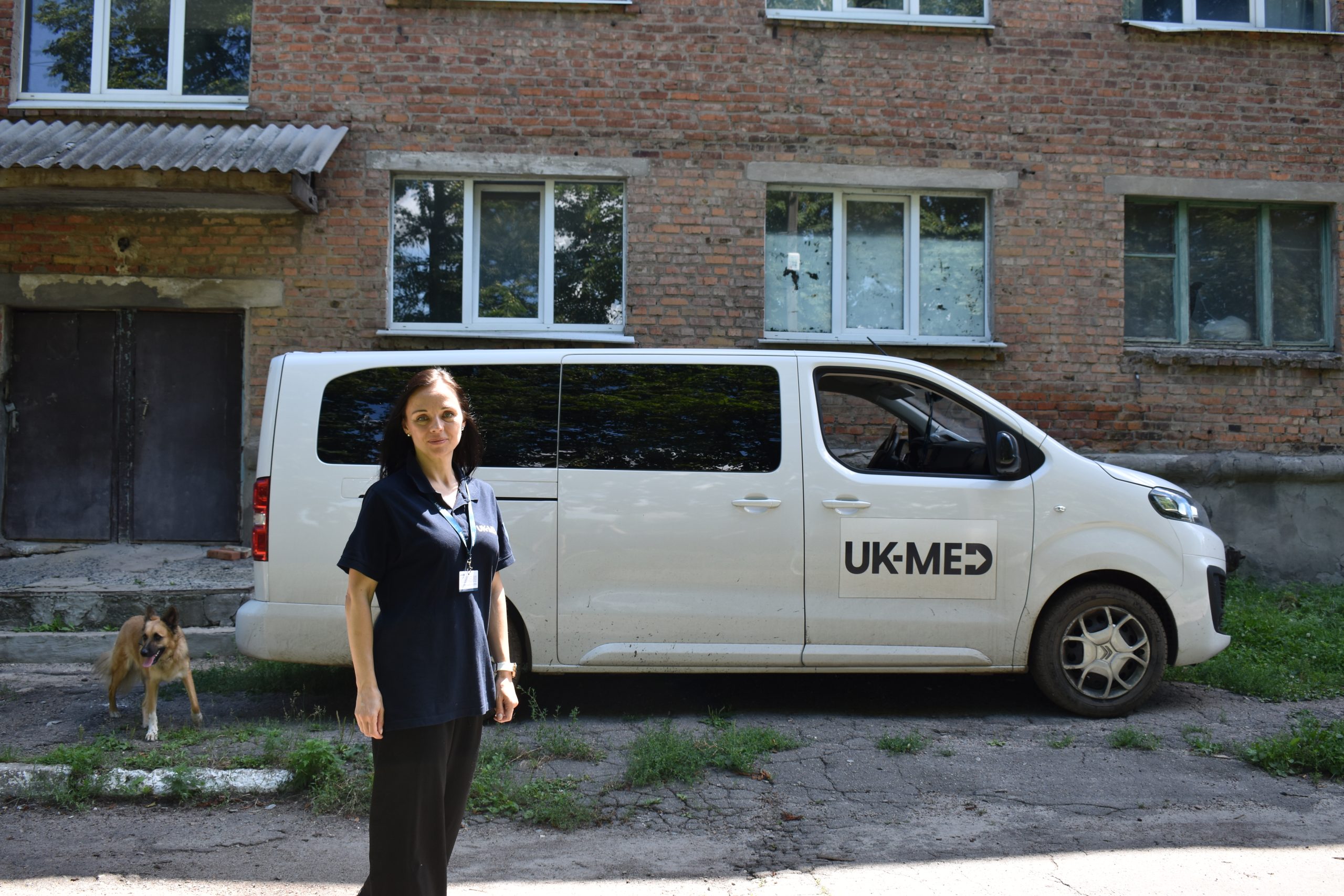
“We help people cope with the most difficult situations in their lives, and then we aim to educate and empower individuals to take an active role in their own health and well-being.”
Evgeniya works for UK-Med as a community health worker, providing everyday support to the people of Ukraine living through the conflict. Having originally left Ukraine at the beginning of the war with her family, she wanted to use the expertise gained while away to help her community. Hearing about UK-Med’s work providing care for those in need, she returned to offer her support.
What inspired you to become a community health worker?
I am a sociologist by my first education, and at that time I was interested in social inequality, in which there are differences in access to resources, opportunities and privileges between different groups of people in society. Including differences in access to education, power, health care and other aspects of life.
Later, I became a graduated holistic health consultant, using a comprehensive approach to health and well-being, paying special attention to lifestyle factors, emotional well-being and spiritual balance, as well as physical health.
And working in the UK-Med mobile clinic became an ideal opportunity for me, where I can use all my combined experience. Working together with doctors and psychologists, we help people cope with the most difficult situations in their lives, and then we aim to educate and empower individuals to take an active role in their own health and well-being.
How did you come to work with UK-Med in Ukraine?
At the beginning of the war, I left for Germany with my family to ensure their safety. There, I had the opportunity to work as a volunteer with Ukrainian refugees. Suddenly finding themselves in a foreign country, people were in deep despair. Together, we went through all the stages of adaptation to a new life step–by–step. After some time, I learnt that in Ukraine there is the same opportunity to provide support for people as part of a humanitarian mission. Without hesitation, I returned home, leaving my family safe.

What does a typical day look like for you on the mobile medical unit?
Every working day is a new challenge. We work in the areas closest to the front line, and this means that you can never be sure how the day will go. Our patients are often very anxious and look forward to seeing us every time. In those areas, people are so afraid of being cut off from any help and support. And that is why it is so valuable that we provide comprehensive assistance, including first psychological aid, medical support, work with both physical and mental health. Our work also includes support in social adaptation and educational activities within the framework of RCCE (Risk Communication and Community Engagement).
Can you describe the communities you visit?
We mainly go to frontline villages where elderly people remain. There is often no access to any medical care or medicine. You need to get to the nearest pharmacies and medical centres by transport. But in these regions, this is almost impossible for many reasons: there are no roads, it is unsafe, there is no transport or funds for travel or transport is currently unavailable.
We also visit shelters where displaced people live. They feel safer there, but they also have difficulty accessing medical services. Often people do not have any documents or medical history, and this complicates and delays the process of providing medical care. Often, people experiencing severe post-traumatic stress avoid any help. Important factors that make people more likely to turn to UK-Med are our quick and easy access, gentle, friendly treatment of people, and most importantly our emphasis on prioritizing self-care in a crisis.
How do you and the team keep things running smoothly in sometimes unpredictable conditions?
In my opinion, the key to successful teamwork is a deep understanding of our mission, where one of the principles is the obligation to solve problems related to human suffering, paying special attention to the most vulnerable categories. This means that the well-being and survival of those affected by crises must be a priority. Based on these values, we try to maintain a positive and optimistic attitude, which can help the team stay motivated and focused. We also try to communicate openly and build trusting relationships in the team, provide all kinds of help and support to each other. We also try to be flexible and adaptive, considering unpredictable situations.
Are there any moments that really stayed with you?
I remember the selfless work of one of the doctors on our team. At one of our remote locations, a patient suddenly went into cardiac arrest. But since our mobile clinics only provide general therapeutic care and we had no special means for saving, the situation got out of control. However, solely through physical efforts and the doctor’s steadfastness, he brought her back to life. Only after that was it possible to arrange for an ambulance to arrive and take the woman to the hospital. And to this day, everything is fine with her.

After some time, I learnt that in Ukraine there is the same opportunity to provide support for people as part of a humanitarian mission. Without hesitation, I returned home, leaving my family safe.






